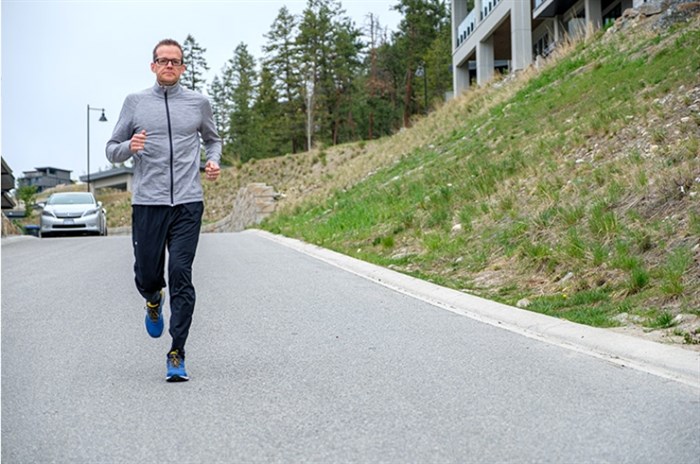
UBC Okanagan associate professor Jonathan Little says regular exercise will boost the immune system in these days of COVID-19.
Image Credit: SUBMITTED / UBCO
April 30, 2020 - 2:30 PM
While there’s no scientific proof that regular exercise can prevent or cure COVID-19, UBC Okanagan associate professor Jonathan Little says it probably helps.
Little does research in the university’s School of Health and Exercise Sciences and knows there are proven links between exercise and a stronger immune system.
“There’s been no studies on exercise and COVID specifically, but there are many years of research that exercise and the immune system are linked and performing regular exercise will make your immune system better – both from killing off pathogens to recovering,” he told iNFOnews.ca. “Whether that is specific to infection with SARS-CoV-2 we don’t know yet but it would make logical sense to be recommending that we remain regularly active during this time because your immune system seems to be functioning best when you are active and exercising regularly.”
The research shows that exercise not only increases blood flow but also has a positive effect on hormones and chemicals in the body.
“A lot of your immune cells are actually stuck to the inside lining of your blood vessels and they rest there until called upon,” Little said. “The increase in blood flow can release some of those immune cells and they get out into circulation where they might be able to be better equipped to fight off an infection.”
Epinephrine (also known as adrenaline) is one hormone that’s known to have a positive effect on the immune system.
Then there’s a chemical called Interleukin 6 that gets released from the muscles and 'talks' to other tissues, including immune cells, telling them to get more active.
For sedentary people, just getting up and walking around every 30 to 60 minutes – or, better yet, walking up and down some stairs – is a good starting point.
To have a real impact on the immune system, a minimum of 15 minutes of 'purposeful' exercise each day is a good start but 30 to 40 minutes is better. That can be as simple as walking or gardening. It’s not necessary to work out strenuously for an hour or two a day.
In fact, doing long bouts of intense exercise, like running a marathon or working out at a gym for hours, may do more harm than good.
Studies of marathon runners show that they tend to get sick in the weeks after the race. Those studies are a bit controversial since such races can put participants in close proximity to hundreds or thousands of other people, Little said.
Even so, going on a big bike ride around Okanagan Lake, for example, might not be the best thing for the immune system for people who don’t normally cycle much, Little said.
On the other hand, a 30 to 60 minute ride on the Rail Trail may be one of the best things people can do these days.
To contact a reporter for this story, email Rob Munro or call 250-808-0143 or email the editor. You can also submit photos, videos or news tips to the newsroom and be entered to win a monthly prize draw.
We welcome your comments and opinions on our stories but play nice. We won't censor or delete comments unless they contain off-topic statements or links, unnecessary vulgarity, false facts, spam or obviously fake profiles. If you have any concerns about what you see in comments, email the editor in the link above.
News from © iNFOnews, 2020